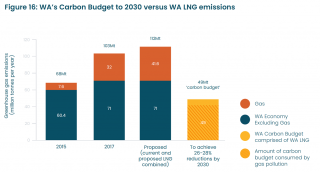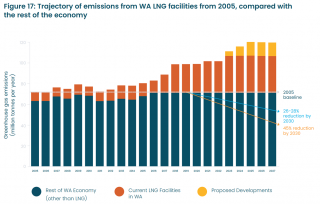I recently attended a seminar exploring the proposal that WA should legislate a carbon budget to reduce its greenhouse gas emissions (GHGe) to net-zero by 2050. It was hosted by the UWA Public Policy Institute and the Centre for Mining, Energy & Natural Resources Law. It was agreed at the outset that the meeting would be held under Chatham House Rule, which may explain my subsequent delivery style.
Over four sessions presentations were given by researchers from Science, Agriculture, Business and Law faculties at WA’s universities as well as practitioners in the arenas of farming, catchment management, policy and conservation. Briefly, the subject topics covered included:
1. Climate change science –
- Setting the context with the latest science in a range of environmental and human health areas, and
- Specific figures on our State’s current and projected emissions with respect to the United Nations Framework Convention on Climate Change Paris Agreement.
2. Legal and policy perspectives from both carbon export and import countries –
- Case studies from Australian and Canadian exporters, and
- Chinese imports of Australian LNG: Implications for Greenhouse Gas Emissions (GHGe), including proposal options for an Emissions Trading Scheme and transparency and national standards required for effective monitoring, reporting and verification.
3. Opportunities for a net-zero greenhouse gas emissions economy, such as –
- Livestock industries need for a combination of methane mitigation, vegetation management and offset strategies, and
- Consideration of GHGe to achieve net zero GHGe economy look likely to change the nature of Environmental Impact Assessment practice as we know it and currently practice it.
Of all the valuable information and analysis presented during this seminar, the following two graphs (Figure 1) spoke to just how big the task ahead is for us collectively in Western Australia.
 |
 |
| Figure 1. These two graphs illustrate how WA’s GHGe’s are tracking with reference to Australia’s 2030 Paris Agreement commitments. (These figures, presented at the seminar, are taken with permission from the forthcoming Conservation Council of WA publication ‘CCWA & Clean State Report: September 2019’.) | |
Australia’s international commitment under the Paris Agreement requires pollution to be reduced by 26-28% from the 2005 baseline year. But current and proposed projects since 2005 are predicted to add 41.6 million tonnes of pollution per year, equivalent to a 61% increase on WA’s 2005 emissions baseline, and an 8% increase above Australia’s 2005 baseline. WA’s energy minister has previously said the State would have an “aspirational” target of net zero emissions by 2050 and acknowledged the federal government’s 26%-28% reduction target by 2030 and would commit to “working with the commonwealth to achieve this goal”.
There’s clearly a lot of improvements to be had and we’re keen to find ways we can make a positive difference.
As an environmental technology company, Gaia Resources keeps abreast of current trends. As our mission statement says:
Gaia Resources is a consultancy that responsibly delivers
sustainable technology solutions to make the world a better place.
We work on big data projects in areas like biodiversity, health and the environment – you can see this in the scope of our project portfolio. As a good corporate citizen, Gaia Resources applies a “core values test” to all projects that are proposed to us, to see if the projects will “make the world a better place”. Certainly, working with companies to reduce their carbon emissions has a big part to play in making that improvement!
If you’d like to give us your feedback on the issues presented here, or want to know how we can help with tracking, monitoring and reducing carbon emissions, then please leave a comment below, start a chat with us via Facebook, Twitter or LinkedIn, or email me directly via alex.chapman@archive.gaiaresources.com.au.
Alex

Comments are closed.